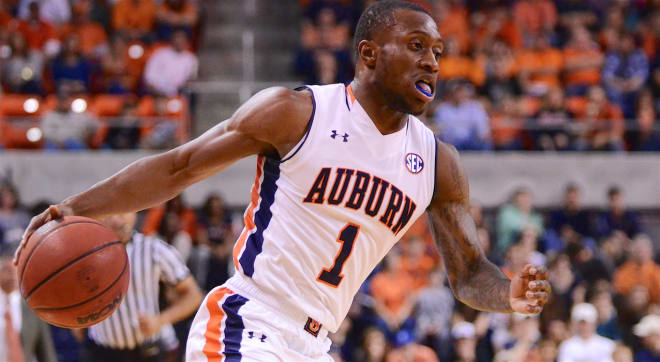Follow from the front
Auburn built big leads in both of its losses this season. Why are the Tigers struggling to retain aggressiveness and efficiency?

AUBURN | Kareem Canty walked away from the Tigers' weekend loss against Middle Tennessee State and didn't fully realize what had just unfolded before his eyes.
Yes, he knew the home team celebrated the win and he didn't.
Still, he felt like Auburn had control of the situation. A nine-point halftime lead evaporated quickly, but Canty hit a few critical shots during the final two minutes to force overtime. From there, Canty figured, the Tigers would cruise.
That didn't happen. MTSU was much better in overtime and Canty couldn't comprehend how it all unfolded.
"It didn’t actually hit me that we lost until I woke up (Sunday) -- and I was kind of mad," said Canty, who scored 28 points on 10-of-20 shooting. "We’ve got a problem with holding big leads that we’ve got to fix and work on. We can’t get complacent when we get a big lead. That’s ultimately my fault because good guards don’t let big leads go away."
That's been perhaps the team's biggest problem this season: Assuming a large lead will yield a victory. Auburn led UAB by 14 points before pulling out a one-point win in the season opener. Auburn led Colorado by 15 points before losing by seven. An 18-point lead at Coastal Carolina with 10 minutes remaining ended with Auburn nervously accepting an 81-78 win.
A nine-point lead was turned around in Nashville.
Though Canty feels complacency is to blame, coach Bruce Pearl things the problems extend a bit further. He found fault Saturday in the Tigers' personnel rotations, which featured fewer players than normal, and the general level of effort from the peripheral contributors.
Canty, forward Tyler Harris and forward Cinmeon Bowers accounted for 61 points. The rest of the team? Just 20 points total -- with nobody scoring more than five.
"We got very strong contributions from a few players and we did not get enough from others," Pearl said. "Offensively and defensively, we need to be fully engaged. We have to spread the minutes out a little more. Our transition defense was bad and that's something we need to improve on. I thought that Middle Tennessee did enough defensively to disrupt us. Part of it was them, but part of it was ourselves. We have to work hard to get open and improve our angles."
Offense hasn't been a problem this season. In fact, this Auburn team is scoring more effectively and efficiently than any Auburn team of the past two decades. At least so far. Even against MTSU, which was the team's worst scoring performance in terms of points per possession, Auburn ended regulation time with 73 points.
That's hardly a failure.
Post defense has been an issue. Auburn is allowing opponents to shoot 49.8 percent from two-point range, which ranks 216th nationally, and the team's opponent free-throw rate, which assesses a team's ability to defend without fouling, ranks 227th. Bowers often is a below-average defender in the post while Harris was uncharacteristically foul-prone against MTSU.
The Blue Raiders finished with a nine-point advantage at the line last weekend.
Pearl acknowledges both the high points (scoring) and low points (post defense) of this tean, but remains optimistic that his grand design is becoming a reality. This team, he said, still is learning how to play together.
"There are just a lot of moving parts, and offensively, defensively how we handle things, how we grow, how we improve, how we stay together, those are the challenges," Pearl said. "Because we have so many new guys, there’s not as much to build on. But there’s enough there where we’re going to get better. We’re going to keep improving and we are going to keep growing.”
MERCER AT AUBURN
When: Tonight, 8 p.m. CST
Where: Auburn Arena
On the tube: SEC Network
| SEASON | POINTS PER POSSESSION | NATIONAL RANK |
|---|---|---|
|
2015-16 |
1.120 |
35 |
|
2014-15 |
.962 |
253 |
|
2013-14 |
1.030 |
155 |
|
2012-13 |
.938 |
260 |
|
2011-12 |
.930 |
281 |
|
2010-11 |
.909 |
308 |
|
2009-10 |
1.030 |
98 |
|
2008-09 (NIT) |
1.012 |
128 |
|
2002-03 (NCAAs) |
1.013 |
120 |
|
2000-01 |
1.022 |
98 |
|
1999-00 (NCAAs) |
.989 |
133 |
|
1998-99 (NCAAs) |
1.099 |
8 |
